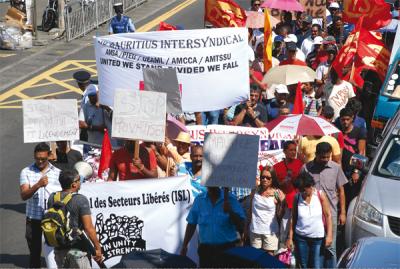La motion de l’appel du jugement défavorable rendu, le 14 octobre dernier, par le juge David Chan Kan Cheong, quant à la demande d’injonction par le Dr Madhewoo, pour contester la carte biométrique a été logée, jeudi, en Cour suprême. Parallèlement, le “main case” logé par le plaignant sera appelé le 28 novembre.
Dans ses “grounds of appeal” au nombre de 15, le Dr Madhewoo, par le biais de ses hommes de loi, estime que le juge David Chan Kan Cheong a eu tort de statuer que “there is no general right of privacy under the Constitution in particular, under Sections 3 and 9 of the Constitution.” Il souligne, par ailleurs, que le juge a eu tort de conclure que “the European Court of Human Rights unanimous decision of S and Marper v UK was not applicable, notwithstanding that it has been clearly established that the fundamental rights protected under Chapter II of the Constitution is akin to the European Convention on Human Rights.”
L’appelant maintient principalement que son droit à la vie privée est violé, faisant référence aux Sections 3 et 9, couplée à l’article 22 du code civil : “The learned judge was wrong to conclude that : the applicant has… failed to show urgency on account of a clear or blatant violation of his constitutionally entrenched rights such as to warrant the intervention of the judge in Chambers’, notwithstanding the fact that there is a blatant violation of the Applicant’s (now appellant) constitutional right to privacy as per Sections 3 and 9 coupled with article 22 of the civil code.”
Pas de proper balancing
Le Dr Madhewoo reproche au juge de n’avoir pas effectué “a proper balancing exercise on the question of convenience as he failed to take into consideration whether damages would be a sufficient or appropriate remedy, whether the wrong alleged will cause irreparable prejudice or whether more harm will be done by granting or refusing an injunction”.
Il est également reproché au juge Chan d’avoir trouvé que le “threshold test to grant an injunction in the present was much more than a serious question to be tried’and that applicant (now appellant) had to establish ‘a flagrant violation of a constitutionally protected right’”.
Parallèlement, Rajah Madhewoo, soutenu par le Regroupement des travailleurs sociaux (RTS), a logé son procès principal contre l’État et le ministre des Technologies de l’information et de la communication (TIC). Dans sa “plaint with summons”, le contestataire du projet de nouvelle carte d’identité réclame en effet l’arrêt de toutes les procédures et évoque plusieurs points “anticonstitutionnels” au sujet de la collecte, du traitement et de la rétention de ses données biométriques, tout en déplorant la décision “unilatérale” de l’État de lui imposer de soumettre ses empreintes digitales.
L’affaire, mentionnée, jeudi, devant la Master and Registrar, Gaytree Mana, sera appelée de nouveau en Cour suprême le 28 novembre. Le Dr Madhewoo est défendu par un panel d’avocats philanthropiques composé du Leading Counsel, Me Sanjeev Teeluckdharry, des avocats Me Erickson Mooneeapillay et Me Neeven Moonesamy, et de l’avoué Me Kaviraj Bokhoree.
EN COUR SUPRÊME : La Plate-forme Say No to ID Cards fait appel contre l’injonction
- Publicité -
EN CONTINU ↻


